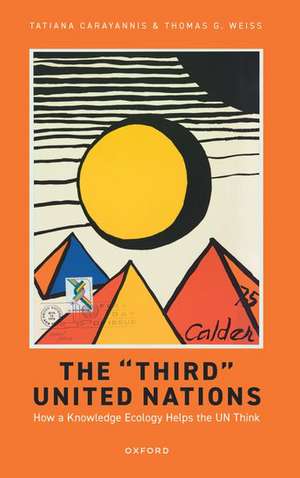The 'Third' United Nations: How a Knowledge Ecology Helps the UN Think
Autor Tatiana Carayannis, Thomas G. Weissen Limba Engleză Paperback – 27 apr 2023
Preț: 181.90 lei
Preț vechi: 223.81 lei
-19% Nou
Puncte Express: 273
Preț estimativ în valută:
34.81€ • 36.27$ • 28.82£
34.81€ • 36.27$ • 28.82£
Carte disponibilă
Livrare economică 03-08 martie
Livrare express 26 februarie-04 martie pentru 64.97 lei
Preluare comenzi: 021 569.72.76
Specificații
ISBN-13: 9780198882688
ISBN-10: 0198882688
Pagini: 224
Dimensiuni: 154 x 235 x 13 mm
Greutate: 0.34 kg
Editura: OUP OXFORD
Colecția OUP Oxford
Locul publicării:Oxford, United Kingdom
ISBN-10: 0198882688
Pagini: 224
Dimensiuni: 154 x 235 x 13 mm
Greutate: 0.34 kg
Editura: OUP OXFORD
Colecția OUP Oxford
Locul publicării:Oxford, United Kingdom
Recenzii
In this impressive book, the authors Tatiana Carayannis and Thomas G. Weiss remind us that the UN system cannot survive without the input and ideas of an array of independent thinkers and players and actors, including research centers, human rights experts, economists, consultants, digital networks, and specialists of all sorts who daily help the UN carry out its Charter obligations. Indeed, in many ways, the unheralded 'Third UN' serves as one of the great strengths of the world's most indispensable security body.
From scholars to think-tanks, NGOs to foundations, all of us working on global governance owe the authors a great debt of gratitude. Without their seminal work on the "Third UN", we simply would not have the language or evidence to demonstrate that civil society inclusion is not just 'nice to have' but essential to securing peace, sustainable development and human rights for all.
Carayannis and Weiss pithily anatomize the intellectual community that 'helps the UN think.' This is an excellent handbook for researchers wondering how to get the world organization to listen to their big ideas and a must-read for anyone who wants to get into the UN advocacy business.
The examples presented by the authors demonstrate how important the development of new ideas and their transmission into the ''first'' and ''second'' UN is for the reform processes of the United Nations.
The book presents the most comprehensive overview to date of external actors contribution to the formulation of ideas for decision-making in the UNs policy processes... the authors have given UN scholars many opportunities to connect the book to scholarship on international organizations and non-state actors and advance research in this area in a more fruitful and systematic manner...Tatiana Carayannis and Thomas G. Weiss have written a fascinating book of immense value to every student and scholar researching the UN, that will also give UN experts and global policymakers fresh insights, thanks to the original data the authors were able to assemble because of their unique expertise.
From scholars to think-tanks, NGOs to foundations, all of us working on global governance owe the authors a great debt of gratitude. Without their seminal work on the "Third UN", we simply would not have the language or evidence to demonstrate that civil society inclusion is not just 'nice to have' but essential to securing peace, sustainable development and human rights for all.
Carayannis and Weiss pithily anatomize the intellectual community that 'helps the UN think.' This is an excellent handbook for researchers wondering how to get the world organization to listen to their big ideas and a must-read for anyone who wants to get into the UN advocacy business.
The examples presented by the authors demonstrate how important the development of new ideas and their transmission into the ''first'' and ''second'' UN is for the reform processes of the United Nations.
The book presents the most comprehensive overview to date of external actors contribution to the formulation of ideas for decision-making in the UNs policy processes... the authors have given UN scholars many opportunities to connect the book to scholarship on international organizations and non-state actors and advance research in this area in a more fruitful and systematic manner...Tatiana Carayannis and Thomas G. Weiss have written a fascinating book of immense value to every student and scholar researching the UN, that will also give UN experts and global policymakers fresh insights, thanks to the original data the authors were able to assemble because of their unique expertise.
Notă biografică
Tatiana Carayannis is Director of the Social Science Research Council's Conflict Prevention and Peace Forum (CPPF) and Understanding Violent Conflict (UVC) program. She also leads the Council's China-Africa Knowledge Project and has a visiting appointment at the London School of Economics and Political Science's Africa Centre, where she also serves as a Research Director for the Centre for Public Authority and International Development (CPAID). Her publications include UN Voices: The Struggle for Development and Social Justice? (with T G Weiss, L Emmerij, and R Jolly, Indiana University Press, 2005), and Understanding the Central African Republic (with Louisa Lombard, Zed Book, 2015).Thomas G. Weiss is Presidential Professor of Political Science and Director Emeritus of the Ralph Bunche Institute for International Studies at The City University of New York's Graduate Center; he is also Co-Chair, Cultural Heritage at Risk Project, J. Paul Getty Trust; Distinguished Fellow, Global Governance, The Chicago Council on Global Affairs; and Eminent Scholar, Kyung Hee University, Korea. His most recent single-authored publications include Would the World Be Better without the UN? (Polity Press, 2018), What's Wrong with the United Nations and How to Fix It (Polity Press, 2016); and Humanitarian Intervention: Ideas in Action (Polity Press, 2016).
